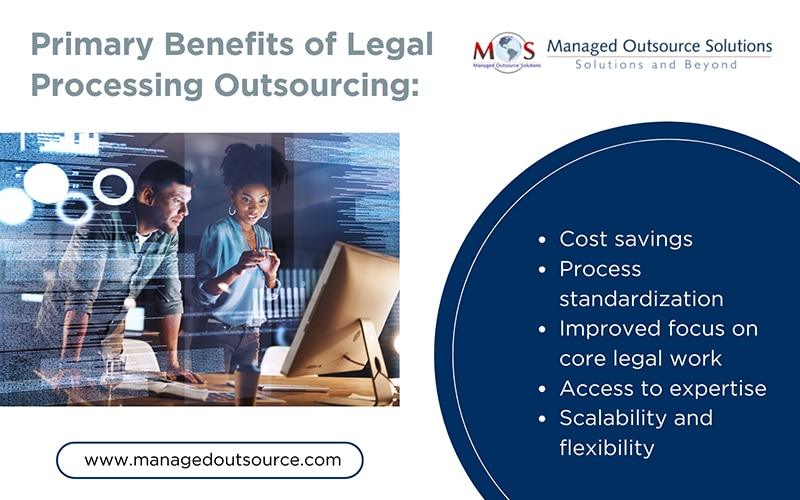What is Legal Process Outsourcing?
Legal process outsourcing (LPO) or legal business process outsourcing (legal BPO) refers to the practice of delegating non-core legal processes and tasks to third party service providers. Law firms can leverage the specialized legal outsourced solutions to enhance the efficiency and productivity of the workplace.
LPO is mainly categorized into two:
- Core law services
- Complementary legal services
Key legal services require specialized knowledge of law and leverage the expertise of attorneys, paralegals, and other legal professionals. On the other hand, complementary services enhance the efficiency of administrative tasks with the help of legal assistants. Here are some niche areas that law firms outsource to save time, reduce workload, and cut costs:
- Document review and management
- Legal research, writing, and drafting
- Contract management
- Litigation support
- Compliance and regulatory
- Legal translation
- Data entry and coding
Key Benefits of Legal Processing Outsourcing
A legal process outsourcing company offers a myriad of benefits that can significantly impact the success of a law firm. Here’s a list of key advantages:
- Cost Savings
One of the key benefits of hiring a LPO provider is substantial cost reduction. Managing an in-house team would involve overhead expenses related to salaries, equipment, and office space. By delegating repetitive and routine tasks to a specialized outsourcing partner, legal practices can save money without sacrificing quality, improve resource utilization, and increase productivity.
- Process Standardization
Outsourced solutions standardize legal processes, enabling lawyers to streamline their workflows and enhance efficiency. Outsourced solutions leverage specialized systems and technologies to automate manual tasks and reduce the turnaround time for cases. Strategic process implementation not only eliminates administrative burdens but also enhances the overall quality of processes.
- Enhanced Focus on Core Work
Outsourcing non-core activities allows lawyers to focus on their core legal activities. By redirecting their time and effort towards high-value core work such as client consultation and case strategy creation, practices can improve productivity and drive better results for clients. By showcasing a deeper commitment towards client-centric approach, law businesses can maximize client satisfaction and gain a competitive edge.
- Access to Expertise
Partnering with LPO providers opens up the access to a wider pool of talented professionals and experts, supporting work on complex cases. Outsourcing provides access to expertise in specific areas, helping law firms to meet client needs without hiring full-time employees.
- Scalability and Flexibility
LPO services offer scalability and flexibility for law firms, allowing them to adjust their services to meet areas of need and budget considerations. When law practices face fluctuating workloads such as heavy case periods or seasonal spikes, outsourcing can provide scalable solutions without needing to hire permanent staff. Scaling operations based on demand allows for more flexibility and freedom to take on revenue-generating projects or clients, enabling firms to venture into new legal domains.
Tips for Choosing the Right LPO Provider
The legal market is filled with an abundance of LPO providers which may confuse law firms on how to select the ideal company that fulfills their specific requirements. Here are some key factors to consider when choosing an LPO partner:
- Expertise and specialization: Take into account the expertise and specialization of the company to ensure their services are relevant to your firm’s needs. The LPO provider should have an ample understanding of your particular niche to do the work efficiently and accurately.
- Experience and reputability: Consider the LPO provider’s industry experience. Check their past track record and confirm their reliability and capabilities.
- Client testimonial and reviews: Seek direct feedback from their past and current clients to gauge their customer satisfaction and performance.
- Legal and ethical obligations: Assess their compliance culture by ensuring that all staff adheres to relevant laws and industry standards to upload legal and ethical responsibilities.
- Security measures: Confirm that the company has robust data security measures, such as encryption, access controls, and safe data transfer to protect client confidentiality and privacy.
- Quality control: Make sure the LPO provider has stringent quality control protocols in place, such as audits, feedback mechanisms, etc.
When is Legal BPO a Good Fit for a Firm?
Outsourcing legal processing services can be a good fit for your firm if it has the following requirements:
- Has to handle high volumes of repetitive or low-complexity legal work including document review, research, and contract management.
- Is seeking to reduce operational and administrative costs without compromising on service quality.
- Needs to enhance operational efficiency with the help of specialized skilled teams or modern technologies.
- Requires additional capacity during peak periods and needs to scale its operations without immediately increasing in-house headcount.
Looking ahead, the demand for legal process outsourcing services is most likely expected to grow, driven by the technological advancements, increasing market competition, and the need for proactive strategies to meet the rising challenges. By collaborating with outsourced LPO providers, law firms can reduce costs, improve efficiency, and scale operations.





